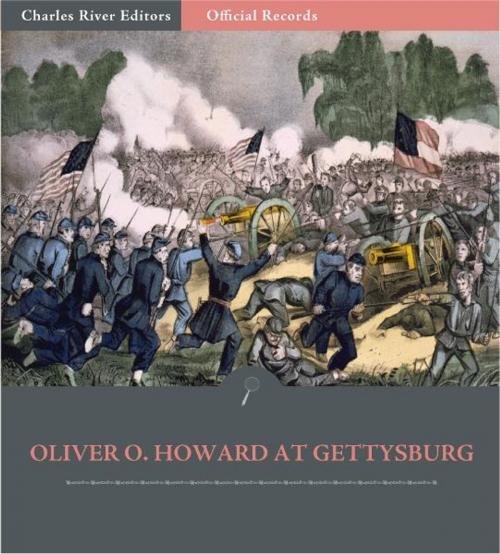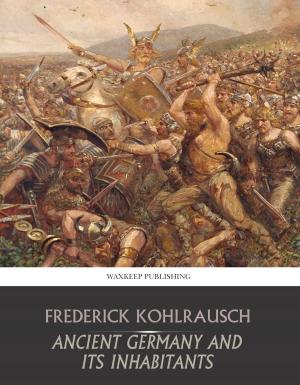Official Records of the Union and Confederate Armies: General Oliver O. Howard at Gettysburg
Nonfiction, History, Americas, United States, Civil War Period (1850-1877), 19th Century, Military| Author: | Oliver O. Howard | ISBN: | 9781619824966 |
| Publisher: | Charles River Editors | Publication: | February 15, 2012 |
| Imprint: | Language: | English |
| Author: | Oliver O. Howard |
| ISBN: | 9781619824966 |
| Publisher: | Charles River Editors |
| Publication: | February 15, 2012 |
| Imprint: | |
| Language: | English |
Oliver Otis Howard (November 8, 1830 October 26, 1909) was a career United States Army officer who had a mostly successful career, but unfortunately for him, he is mostly remembered for suffering two of the most humiliating defeats of the Civil War. Despite effective service throughout much of the war in both the East and the West, Howard is mostly remembered as the commander of the XI Corps at Chancellorsville and Gettysburg. At Chancellorsville, the XI Corps was on the receiving end of Stonewall Jacksons march and turn, routing Howards Corps. Howards Corps was also badly beaten on Day 1 of Gettysburg and sent scurrying through the streets of the town in retreat. On June 1, 1862, while commanding a Union brigade in the Fair Oaks, Howard was wounded twice in his right arm, which was subsequently amputated. (He received the Medal of Honor in 1893 for his heroism at Fair Oaks.) Respected general Philip Kearny, who had lost his left arm, visited Howard and joked that they would be able to shop for gloves together. Howard recovered quickly enough to rejoin the army for the Battle of Antietam, in which he rose to division command in the II Corps. He was promoted to major general in November 1862 and assumed command of the XI Corps the following April. After being embarrassingly routed by Stonewall Jacksons flank attack at Chancellorsville, Howard and the XI Corps found themselves in the thick of the fighting during Day 1 of the Battle of Gettysburg. Yet again the XI Corps would suffer a devastating flank attack and fall back in disorder through the town of Gettysburg on the way back toward Culps Hill and Cemetery Hill. Howard wrote an account of the Battle of Gettysburg, focusing of course on Day 1, and it was preserved in The War of the Rebellion: Official Records of the Union and Confederate Armies, reflect this. This edition of his account includes pictures of the important commanders of the battle.
Oliver Otis Howard (November 8, 1830 October 26, 1909) was a career United States Army officer who had a mostly successful career, but unfortunately for him, he is mostly remembered for suffering two of the most humiliating defeats of the Civil War. Despite effective service throughout much of the war in both the East and the West, Howard is mostly remembered as the commander of the XI Corps at Chancellorsville and Gettysburg. At Chancellorsville, the XI Corps was on the receiving end of Stonewall Jacksons march and turn, routing Howards Corps. Howards Corps was also badly beaten on Day 1 of Gettysburg and sent scurrying through the streets of the town in retreat. On June 1, 1862, while commanding a Union brigade in the Fair Oaks, Howard was wounded twice in his right arm, which was subsequently amputated. (He received the Medal of Honor in 1893 for his heroism at Fair Oaks.) Respected general Philip Kearny, who had lost his left arm, visited Howard and joked that they would be able to shop for gloves together. Howard recovered quickly enough to rejoin the army for the Battle of Antietam, in which he rose to division command in the II Corps. He was promoted to major general in November 1862 and assumed command of the XI Corps the following April. After being embarrassingly routed by Stonewall Jacksons flank attack at Chancellorsville, Howard and the XI Corps found themselves in the thick of the fighting during Day 1 of the Battle of Gettysburg. Yet again the XI Corps would suffer a devastating flank attack and fall back in disorder through the town of Gettysburg on the way back toward Culps Hill and Cemetery Hill. Howard wrote an account of the Battle of Gettysburg, focusing of course on Day 1, and it was preserved in The War of the Rebellion: Official Records of the Union and Confederate Armies, reflect this. This edition of his account includes pictures of the important commanders of the battle.















